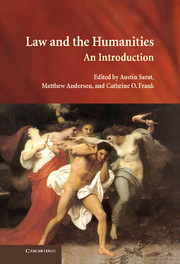Book contents
- Frontmatter
- Contents
- Contributors
- Acknowledgments
- Introduction: On the Origins and Prospects of the Humanistic Study of Law
- I PERSPECTIVES ON THE HISTORY AND SIGNIFICANCE OF SCHOLARSHIP IN LAW AND THE HUMANITIES: THREE VIEWS
- II IDEAS OF JUSTICE
- 4 Biblical Justice: The Passion of the God of Justice
- 5 Ideas of Justice: Natural and Human
- 6 Ideas of Justice: Positive
- 7 Postmodern Justice
- III IMAGINING THE LAW
- IV LINGUISTIC, LITERARY, AND CULTURAL PROCESSES IN LAW
- V INSTITUTIONAL PROCESSES
- Index
- References
6 - Ideas of Justice: Positive
Published online by Cambridge University Press: 20 January 2010
- Frontmatter
- Contents
- Contributors
- Acknowledgments
- Introduction: On the Origins and Prospects of the Humanistic Study of Law
- I PERSPECTIVES ON THE HISTORY AND SIGNIFICANCE OF SCHOLARSHIP IN LAW AND THE HUMANITIES: THREE VIEWS
- II IDEAS OF JUSTICE
- 4 Biblical Justice: The Passion of the God of Justice
- 5 Ideas of Justice: Natural and Human
- 6 Ideas of Justice: Positive
- 7 Postmodern Justice
- III IMAGINING THE LAW
- IV LINGUISTIC, LITERARY, AND CULTURAL PROCESSES IN LAW
- V INSTITUTIONAL PROCESSES
- Index
- References
Summary
We use the term “justice” in many different ways. In this chapter, I consider justice only as it used in Anglo-American political and legal theory. In this realm of discourse, all forms of justice consist of nonutilitarian allocative principles, that is, principles governing, to put it as broadly as possible, who gets how much of what. Some may wish to treat utilitarian principles as principles of justice. As a matter of nomenclatural pedantry, this is surely reasonable. Perhaps as a consequence of John Rawls' arguments in Theory of Justice, or perhaps as a result of Aristotle's classifications of two forms of justice in the Nicomachean Ethics, or perhaps as a result of John Stuart Mill's appreciation of the need for reconciling utilitarianism with justice, we generally think of justice as consisting of principles that are sensitive to factors to which most forms of utilitarianism are blind. Furthermore, thanks to Rawls, we generally think of distributive justice in particular as being primarily applicable to political and social institutions and not to individual actors (this, however, has been challenged by those who would still recognize a sharp distinction between utilitarianism and justice). Regardless of whether this distinction between justice and utilitarianism is sustainable in the long term, I shall presume it, if only to make clear what is at stake if we are to treat utilitarianism as just one form of justice.
There is much more to the moral and ethical universe than allocative principles of justice.
- Type
- Chapter
- Information
- Law and the HumanitiesAn Introduction, pp. 161 - 187Publisher: Cambridge University PressPrint publication year: 2009



